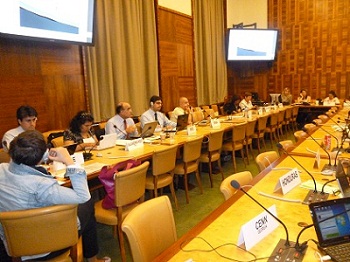29 August 2012, Geneva, Switzerland - The Final Meeting of the Steering Committee of the GEF/UNEP/UNITAR Project “POPs Reporting, Monitoring and Information dissemination using Pollutant Release and Transfer Registers (PRTRs)” was held on 29-30 August 2012, in Geneva, Switzerland. The meeting was held back-to-back with an awareness-raising meeting on PRTRs for NGOs and working sessions with the partner countries of the project.

The meeting was attended by 45 participants representing high-level environmental authorities and technical officers of the partner countries, NGOs and international organizations. It included:
- an overview about PRTRs and Persistent Organic Pollutants (POPs) by various international agencies such as the Basel, Rotterdam and Stockholm Convention Secretariat; the Commission for Environmental Cooperation in North America (CEC); and OECD
- sharing of experiences among the partner countries and OECD countries on PRTR implementation and NGO involvement in environmental information dissemination (with participation of representatives of Mexico, Spain, Switzerland, and the United States
- review of results of the project and future actions for countries on implementing PRTRs and using them as tools for reporting POPs
- identification of lessons learned on designing and implementing PRTRs by countries and NGOs.
The meeting was the culmination of a 4-year project involving 6 countries (Chile, Cambodia, Ecuador, Kazakhstan, Peru, and Ukraine) in which PRTRs were designed, including the list of priority chemicals to report (including POPs), the legal and administrative procedures, and information dissemination aspects of the system. Other countries designing PRTRs were also invited to the meeting (Georgia and Honduras). An important lesson learned was the strong need to set PRTRs as a priority within national development and environmental plans, have legislation or global policy on PRTRs and the integration of national environmental reporting schemes. All project countries concluded the meeting by stating their strong intention to continue the process of implementing their PRTRs and to work towards the responsible use of PRTR data. It was indicated during the meeting that further support for PRTR implementation in the partner countries would be valuable.
For more information: http://prtr.unitar.org/component/content/article/77

